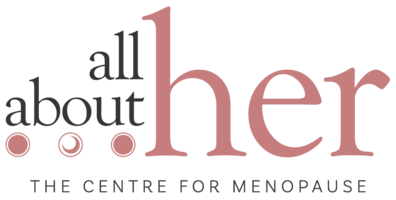
Inspired by a Professional Development session for our All About Her Professional Members with Professor Gemma Sharp
When we talk about eating disorders, our minds often jump to adolescent girls, diet culture, and disordered relationships with food. But the reality is more complex and more widespread than many of us realise. One demographic still largely missing from the conversation? Midlife women.
Thanks to the trailblazing work of Professor Gemma Sharp and her team, we’re beginning to shed light on the critical intersection of eating disorders and the menopause transition. And what we’re finding is both illuminating and deeply concerning.
A Silent Reawakening in Midlife
It was a spike in referrals from midlife women, many of whom had previously experienced and recovered from eating disorders, that first caught Professor Sharp’s attention. Women were returning to therapy, surprised by a resurgence of old behaviours: binge eating, body dissatisfaction, preoccupation with weight, and restrictive eating patterns.
This wasn’t a coincidence.
Menopause, like puberty and the postpartum period, is a significant hormonal shift. But unlike puberty, its relationship to eating disorders has been under-researched and, more critically, under-recognised in clinical care.
Many women Professor Sharp encountered were unsure if they were even going through menopause. Despite seeking help for disordered eating, few had conversations with their doctors about what was happening hormonally. This gap in care speaks volumes.
Hormones, Sensitivity, and Risk
Emerging research suggests that some women are highly sensitive to changes in estrogen, a key hormone that fluctuates and ultimately declines during perimenopause. For these women, the physiological shift can trigger emotional distress, appetite dysregulation, and an increase in impulsive behaviours, including binge eating or rigid restriction.
In other words, the hormonal landscape of menopause doesn’t cause an eating disorder in itself but it can unearth latent vulnerabilities or exacerbate existing patterns.
Those with a history of high body awareness, or mood sensitivity may be particularly at risk. And while anorexia or bulimia are less commonly reactivated during this life stage, binge eating disorder and OSFED (Other Specified Feeding or Eating Disorders) appear to be far more common.
Why It’s Flying Under the Radar
Many women aren’t seeking help for these issues, not because they aren’t suffering, but because they don’t recognise what they’re experiencing as a ‘problem.’ Disordered eating has been so normalised in our culture, especially in midlife, where weight gain and body changes are often framed as inevitable, that it’s easy to dismiss symptoms as “just what happens” or “a willpower issue.”
And it doesn’t help that most screening tools for eating disorders were designed with young women in mind, usually focusing on restrictive behaviours and low weight. As Professor Sharp emphasised, clinicians need to ask different questions, ones that explore appetite changes, weight fluctuations, body image distress, compensatory behaviours like fasting or over-exercising, and how a woman feels in her body.
Working with Midlife Clients: What Clinicians Should Know
If you’re a psychologist or mental health professional working with women in their 40s, 50s or 60s, here are a few key considerations:
- Trust your instincts. If a client reports changes in their eating habits, weight, or body image, don’t assume it’s minor. Explore gently, with curiosity and compassion.
- Frame it around quality of life. Many women are more open to discussing how their behaviours affect their wellbeing than to immediately labelling their symptoms as an eating disorder.
- Use your therapeutic relationship. The connection you’ve built may be more powerful than any specialist referral, though seeking supervision or collaboration can be helpful.
- Refer for medical checks. Bloodwork, ECGs, and nutritional assessments are essential, particularly if there’s evidence of restriction or physical depletion. The NEDC provides excellent guidelines on what to request: https://nedc.com.au/assets/NEDC-Resources/NEDC-Resource-GPs.pdf?2025052004
- Consider MHT (Menopausal Hormone Therapy). While much more research is needed, there’s emerging anecdotal and clinical evidence that hormone therapy may support women experiencing eating issues in midlife, particularly those with mood or appetite dysregulation.
The Takeaway: Eating Disorders Aren’t Just for the Young
As Professor Sharp so powerfully shared, “All clients eat.” That means eating-related distress is always relevant, regardless of age, body size, or diagnostic label. Menopause is a profound psychological and physiological transition. For many women, it reactivates long-buried patterns around control, identity, body image, and self-worth.
By bringing awareness, empathy, and a willingness to ask the questions, we can help midlife women access the support they need, often for the first time in decades.

Comments